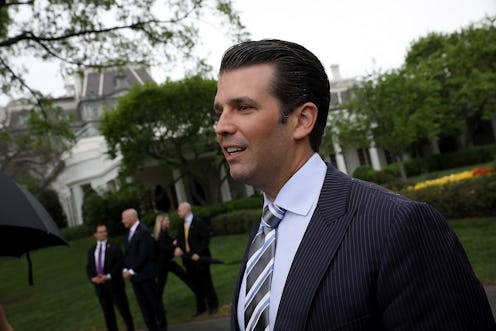News
Don Jr. Liked A Tweet Basically Blaming Mass Murders On Anti-Depressants

On Thursday, Twitter users noticed that Donald Trump Jr. liked a tweet linking antidepressants to murder. The tweet in question was penned by former Saturday Night Live actor Rob Schneider, who claimed that "ALL THESE MASS MURDERERS WERE ON ANTI-DEPRESSANT DRUGS" and implied that the media is engaged in a cover-up. Schneider's claim is easily debunked, and Trump Jr.'s liking of the tweet is part of a long and troubling pattern of behavior on his part.
"Why doesn't CNN or New York Times, Fox News report the fact that ALL THESE MASS MURDERERS WERE ON ANTI-DEPRESSANT DRUGS?" Schneider tweeted on Thursday, apropos of nothing. "#BigPharmaOwnsMedia." Schneider appears to be the first person to use that hashtag.
Schneider didn't say who he was talking about. He may have been referring to the gunman who recently killed 17 people at Marjory Stoneman Douglas High School in Parkland, Florida; however, while a member of that shooter's family said she believed he was on medication to deal with his "emotional fragility," it hasn't been reported that the gunman was on anti-depressants.
Florida shooter aside, Schneider's attempt to link anti-depressants to mass murder is patently silly. According to the Centers for Disease Control and Prevention, over 30 million Americans take anti-depressants at least once a month. Needless to say, the overwhelming majority of those people do not commit mass murder.
Still, the idea that antidepressants are to blame for mass shootings is popular among some conspiracy theorists, and far-right blogs often parrot the fallacious claim. By drawing attention to the claim through his social media account, Trump Jr. effectively demonized tens of millions of Americans who struggle with mental health.
Unfortunately, this isn't the first time the president's son has used social media to promote a false, problematic or downright offensive claim. Shortly after the Parkland shooting, for instance, Trump Jr. liked two tweets that promoted conspiracy theories about David Hogg, an outspoken survivor of the Florida shooting. The tweets suggested that Hogg, far from being a grief-stricken survivor of a massacre, was in fact working with the FBI, and had been coached on his lines prior to giving media interviews.
Earlier in February, former Hollywood star James Woods sent a tweet accusing the FBI of "sedition," and of launching an "actual attempted coup d’état" against the Trump administration. Trump Jr. liked that tweet, too.
After a gunman killed six people at a mosque in Canada, former NYPD officer John Cardillo wrote in a tweet that President Trump would benefit politically "when it's revealed that the #QuebecShooting terrorists are Muslim." Trump Jr. liked that tweet as well, inevitably implying that he would have liked to learn that the shooter was Muslim. As it turns out, the gunman was a far-right Trump supporter.
One could argue, of course, that simply liking a tweet isn't the same as promoting it, because a "like" doesn't necessarily cause a tweet to appear on one's timeline. For that, you need a bona fide retweet — but unfortunately, Trump Jr. has also retweeted more than his own fair share of problematic claims.
Two days before the presidential election, for instance, Trump Jr. retweeted a video in which two alt-right bloggers accused Hillary Clinton of engaging in "satanic rituals," and warned that Clinton associates may try to "kidnap your children, make them disappear, sell them into all kinds of things." The bloggers in question were Vox Day, who believes that homosexuality is a birth defect, and Mike Cernovich, who once said that "date rape does not exist."
Earlier in the campaign, Trump retweeted a false claim — also made by Day — about how a woman giving a Nazi salute was actually a supporter of Bernie Sanders. In fact, the woman was a Trump supporter.
It may seem silly to place so much emphasis on Trump Jr.'s Twitter activity, but the man is followed by more than 2.5 million people on Twitter, and he's repeatedly used this platform to promote factually-incorrect claims and disreputable people. His decision to like that tweet by Schneider — who, by the way, has less than half as many followers as Trump Jr. — is only the most recent episode in a disturbing, years-long pattern by the president's son.